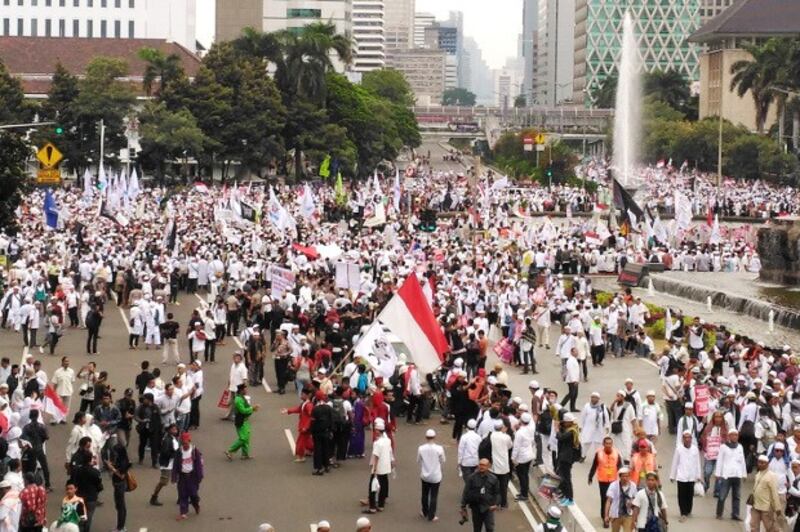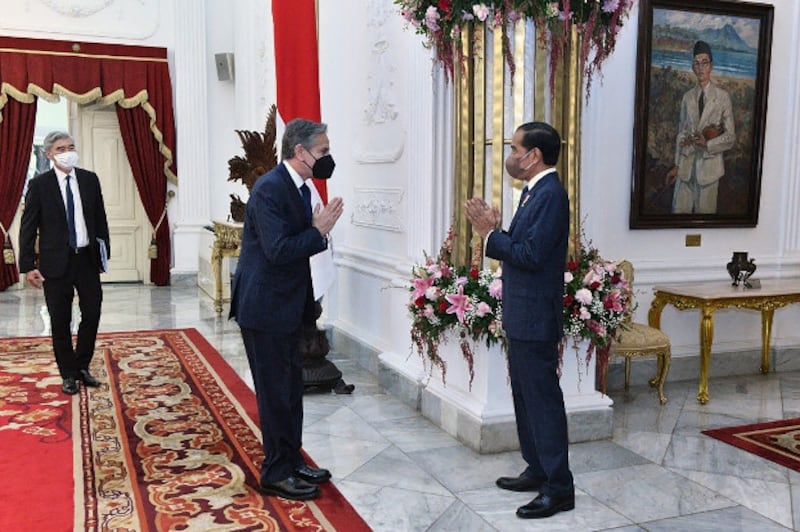The new leader of Indonesia’s largest mass-Muslim organization says he doesn’t intend to enter the political fray or be dragged into communal politics that have divided people in the religiously diverse nation in recent years.
Yahya Cholil Staquf, nicknamed “Gus Yahya,” was elected chairman of the influential Nahdlatul Ulama group in late December, when he defeated two-term incumbent Said Aqil Siradj and three other candidates in a vote during NU’s 34th congress.
“I have stated since the beginning that I do not want to be a presidential or vice-presidential candidate, nor do I want someone from NU as a presidential or a vice-presidential candidate. That way, NU will no longer be involved in identity politics whatsoever,” Yahya told BenarNews in an interview last week.
By “identity politics,” he was referring to a divisive communal streak that has lately infiltrated politics in the Muslim-majority nation. Indonesia has long been known for its moderate brand of Islam and general tolerance toward religious minorities.
NU, which claims to have 90 million members, for most of its existence, has been reputed as a moderate and more progressive faith-based institution.
On several occasions before the NU congress, Yahya expressed his determination to restore to the group the idealism, spirit of inclusiveness and humanity embodied by the late Abdurrahman “Gus Dur” Wahid, who – as the centennial of NU’s birth approaches – remains one of the most revered figures in its history.
Gus Dur, a longtime chairman of NU, went on to serve as president of Indonesia, Southeast Asia’s most populous nation, in 1999-2001, during the early years of its transition to democracy after decades of authoritarian rule. Yahya, 55, acted as the presidential spokesman under Gus Dur.
More recently, Yahya stayed close to the seat of power when he was appointed as a member of the Presidential Advisory Council (Wantimpres) during President Joko “Jokowi” Widodo’s first term.
In his view, NU should play a role in healing the scars and polarization in society that resulted from identity politics, which were on display in the run-up to the 2019 presidential election.
Ma’ruf Amin was Jokowi’s running mate in that election as is serving as vice president.
But in 2017, Ma’ruf was among those calling for the removal from office of Basuki “Ahok” Tjahaja Purnama, Jakarta’s governor who was a member of the Chinese-Christian minority, over alleged blasphemous comments that Ahok made on the campaign trail for reelection. Back in 2017, Ma’ruf was chairman of NU and he sat on the Indonesian Ulema Council (MUI), the nation’s leading body of Islamic clerics and scholars.
A year before the Jakarta gubernatorial election, the Islamic Defenders Front (FPI), a conservative Muslim group that the central government has since banned, led mass protests in the streets of the nation’s capital demanding the arrest and prosecution of “Ahok” for the alleged blasphemy.
In May 2017, a district court in Jakarta convicted Ahok of blasphemy and sentenced him to two years’ imprisonment. Ahok subsequently lost the 2017 gubernatorial election.
Some Indonesians viewed the verdict as politically motivated and suspected that the judges succumbed to pressure from conservative Islamic groups.
Yahya said that fundamentalist Islamic groups such as FPI and Hizbut Tahrir, a pan-Islamic political organization which was dissolved in 2018, were not entirely at fault for wanting Indonesia, as the world’s most populous Muslim-majority nation, to abide by the caliphate concept.
“We know they have political reasons for their choices to be radical or to be fundamental. We have to engage them, we have to try to make them realize that their political choices are no longer realistic,” he told BenarNews during a 45-minute interview by phone on Dec. 31.
“We can no longer impose a universal caliphate in the context of today’s modern reality.”
He also expressed optimism that NU could serve as a mediator by seeking a common framework to curtail, if not withhold, radicalism and fundamentalism in the country.
“Obviously the way to do it is to persevere and campaign as hard as possible to prevent identity politics. We must encourage political stakeholders to build consensus that they would not capitalize on identity, especially religious identity, as a political weapon,” Yahya said.

Israel controversy
In 2018, Yahya stirred public controversy at home when he accepted an invitation from the Israel Council on Foreign Relations (ICFR) to give a speech in Jerusalem on the solution to religious conflicts.
At the time, Yahya was still a member of Wantimpres. The Indonesian public criticized him over the invitation because he was perceived as having put a dent in Indonesia’s support for the Palestinian people.
But Yahya said he went on the trip in a personal capacity and as a regular Muslim who longed for the Palestine-Israel conflict to end, and not as a representative of the government or NU.
In early 2020, during a meeting of leaders from different faiths at the Vatican, Yahya said the world’s religious leaders had agreed to come together to think about how religion functions and responds to conflict in the 21st century.
“Religion must also find its new function. This is the first and this requires a separate process,” he told BenarNews.
As he put it, the Israeli-Palestinian conflict needs to be resolved fundamentally, namely through clarifying territorial boundaries in accordance with international law. As long as boundaries are not made clear, it will be difficult for Israel to gain political recognition, including establishing diplomatic ties with Indonesia, he said.
“A lot of these territorial boundaries are just unilateral claims by both Israel and the surrounding Arab and Islamic countries. This must be resolved first. So if, for example, Indonesia says it is normalizing relations with Israel, which [Israel] is it? The boundaries must be clear so as not to cause new problems,” he said.
The interview with the new NU chairman took place days after news reports emerged saying that U.S. Secretary of State Antony Blinken, during meetings with Indonesian officials in Jakarta last month, had discussed the prospect of Indonesia normalizing ties with the Jewish State.

Yahya also has a proven track record in the international community.
In 2014, he was listed as one of the founders of Bayt Ar-Rahmah, a California-based religious institute which promotes the primary message of Islam as a source of universal love and compassion.
He was entrusted to be a member in the panel of experts who formulate policies in the U.S.-Indonesia Interfaith Executive Council, which was set up after an agreement signed between President Barack Obama and Jokowi in October 2015.
Yahya was also appointed as the envoy of Nahdlatul Ulama’s youth movement and the National Awakening Party (PKB), NU’s political vehicle, to forge political networks in the international community and in Europe.
He said he believes that Indonesia must contribute to develop the world order in accordance with its 1945 constitutional mandate. He also voiced hope that his activities could project the image of a peaceful and moderate Islam in Indonesia.
“I think the Indonesian government should take a bolder action with a concrete agenda in solving existing problems, to penetrate the international politics,” he said.
“[T]o defend anyone who is treated unfairly, to seek a better future for everyone, including our brothers in Palestine or our brothers [the] Uyghurs in China. It even includes non-Muslim groups who also suffer from persecution in Muslim-majority societies.”
Yahya said even though he is now NU chairman, Bayt Ar-Rahmah will keep operating as usual, because he still needs to carry on with its Islamic humanitarian mission, which includes campaigning to eliminate the use of the term “kafir” (infidel) in modern Islamic doctrine.
“The non-Muslims or infidel status is a symbolic object for hostility, discrimination and persecution,” he said.
“We can no longer tolerate or allow such vulnerability because the world has become one, integrated neighborhood, and we have to live side by side with each other,” Yahya told BenarNews.

‘Needs to be supported’
Syafiq Hakim, a lecturer in Islamic studies at the Indonesian International Islamic University, welcomed Yahya’s stated intention to revive Gus Dur’s visions and missions, but said this would require support from all parties.
“If he doesn’t want to be involved in politics by being a presidential or a vice presidential candidate, it seems that he really wants to reinstate Gus Dur’s values. But of course, we don’t know if it would be applicable with NU. Because when it comes to NU, it has so many layers and not all scholars have an open perspective,” Syafiq told BenarNews on Thursday.
According to Syafiq, if Yahya succeeds in reviving NU’s old progressive values, other mass organizations with diverse perspectives and endeavors will likely follow suit, including Muhammadiyah, the second largest Muslim organization in Indonesia.
“That is a working agenda that I think is challenging and needs support, though I have no idea how it will turn out. However, I strongly agree with Gus Yahya’s proposed agenda, and he must put it forward, as a leader of the largest mass organization that protects minority groups,” he said.
PKB, the political party associated with Nahdlatul Ulama, was established to voice the organization’s aspirations in responding to a political crisis during the reform era, which began in 1998 with the downfall of President Suharto, the longtime dictator.
Gus Dur initially refused the idea because he didn't want NU to leave its "khittah" (original pledge) by mixing religious affairs with politics. However, Gus Dur finally relented because he saw this as the only way to fight Golkar, the party associated with Suharto, the authoritarian ruler and former military chief.
According to another observer, it is appropriate for Yahya to want to keep NU out of politics in Indonesia. Yon Machmudi, an Islamic politics expert at the University of Indonesia, said he hoped Yahya would not be steered into mobilizing NU’s large mass following in any political contest.
“If he remains on track with his agenda, it will be a major breakthrough … by returning to NU’s foundational mandate as a religious Islamic organization beyond the struggle for political power,” Yon told BenarNews.
If NU is forced to become involved in politics, this would diminish the organization’s core values and mission in helping to strengthen society, he said.
“I think his statement that he would steer NU away from politics is good and important, so that he can make decisions wisely on political choices without having to become a presidential or a vice presidential candidate, which could potentially cause friction at the grassroots level. I think this is an ideal situation,” Yon said.
This report is the first of two parts.
